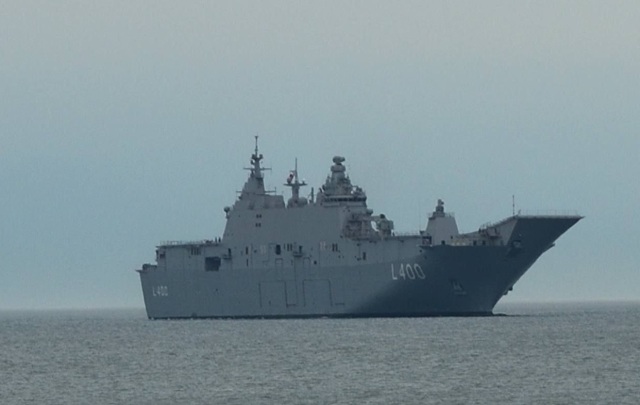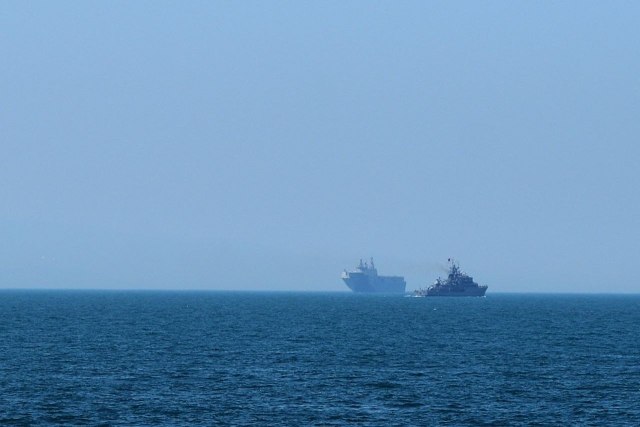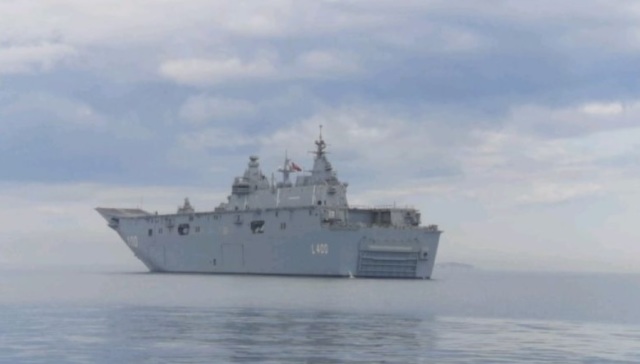The management of the Turkish shipbuilding company Sedef Gemi Inşaatı Sanayii A.Ş (Sedef Shipyard, part of the Turkon holding) reported that on June 22, 2022, the universal amphibious ship L 400 Anadolu, built for the Turkish Navy at the Sedef Tuzla Tersanesi shipyard in Tuzla (southern the outskirts of the Asian part of Istanbul).

Turkish universal amphibious assault ship L 400 Anadolu, which went to sea for factory sea trials, built at the Sedef Tuzla Tersanesi shipyard of the Turkish shipbuilding company Sedef Gemi Inşaatı Sanayii, 06/22/2022 (c) Sedef Gemi Inşaatı Sanayii
Recall that the first Turkish aircraft carrier universal landing ship (UDC) L 400 Anadolu is being built according to the project of the Spanish shipbuilding association Navantia and is actually an analogue of the previously built for the Spanish Navy UDC Juan Carlos I. The contract for the technical design and construction of the UDC for the Turkish Navy by 2021 under the Havuzlu Çıkarma Gemisi (LPD) program under the Juan Carlos I project was signed by Sedef Gemi Inşaatı Sanayii A.Ş. with the Turkish Defense Industry Administration (Savunma Sanayii Müsteşarlığı - SSM, now SSB) on May 7, 2015. The value of the contract was not named, but is unofficially estimated at $ 1.4 billion.
The official ceremony of the first steel cutting for Anadolu UDC took place at the Sedef Tuzla Tersanesi shipyard in Tuzla on April 30, 2016. Speaking at the steel cutting ceremony, Turkish President Erdogan said that this ship will be the first step in creating its own Turkish aircraft carrier, and that "Anadolu will be the first ship of the fleet to use F-35B aircraft."
The decision to choose Sedef and its proposed ship design in the tender under the LPD program was made by SSM on December 26, 2013. Sedef acted in this tender as a representative of the Spanish association Navantia with a proposal for the Juan Carlos I UDC project.
The Havuzlu Çıkarma Gemisi (LPD) program worth $1.7 billion, launched back in 2006, provided for the acquisition of one UDC for the Turkish fleet, as well as for use from it - four LCM-type tank landing boats, two LCVP-type small landing boats and 27 ZAHA amphibious tracked armored personnel carriers. The lead contractor in the delivery was to be a private Turkish shipyard. In February 2010, SSM sent out proposals for participation in the tender to seven Turkish shipbuilding enterprises (ADIK, Çelik Tekne, Dearsan Shipyard, Desan Shipyard, RMK Marine, Sedef and the Naval shipyard in Istanbul), which operated mainly in cooperation with foreign partners (and presented mainly foreign projects). In May 2011, the final competitive list for the program included Sedef (who presented the Juan Carlos I UDC project of the Spanish Navantia), RMK Marine (with its own project developed with the assistance of the British design firm VMT) and Desan Shipyard (who presented the project of the South Korean Hanjin Heavy Industries based on the Dokdo UDC - as a result, SSM on December 26, 2013 awarded him second place).
The resulting choice in favor of the Spanish project was the second export success of the Juan Carlos I project developed by Navantia after the contract for two ships of this type with Australia. Unlike the Australian ships, the hulls of which were built at the Navantia shipyard in El Ferrol with subsequent completion in Australia, the Turkish UDC was completely built at the Sedef Tuzla Tersanesi shipyard in Tuzla in a 310-meter dry construction dock. With a total displacement of 27.5 thousand tons and a hull length of 231 meters, the Anadolu UDC will become the largest warship in the history of the Turkish navy, surpassing the battlecruiser Yavuz (Goeben).
The launching (withdrawal from the dry construction dock of the shipyard) of the Anadolu UDC in Tuzla was carried out on May 4, 2019. According to the terms of the contract, the ship was to be launched within 40 months from the date of the start of construction [April 30, 2016], and sea trials should be carried out 55-59 months after the start of construction - from November 2020, with delivery to the fleet in 2021. However, although earlier the Sedef leadership optimistically declared its readiness to transfer the ship to the Turkish Navy earlier than the contract period - already in 2020, but in fact the completion of the UDC was delayed, and only now the ship has entered factory sea trials, and its actual commissioning, apparently, will take place only in 2023. The Turkish naval flag on Anadolu was raised at the shipyard in a ceremony on March 4, 2022.
An additional factor complicating the fate of the ship was the exclusion in April 2021 by the Americans of Turkey from the Lockheed Martin F-35 aircraft program. As a result, now there is no question of equipping Anadolu with F-35B aircraft, and from 2020 plans are announced to base Turkish-made UAVs on the ship, primarily produced by Baykar Savunma - piston Bayraktar TB3 and jet Bayraktar Kizilelma ( MIUS ). At the same time, in order to ensure the horizontal take-off and landing of these UAVs from the deck of the UDC, Anadolu is supposed to be equipped with special acceleration and braking devices in the future.
The management of Sedef and the Turkish Ministry of Defense have repeatedly reported since the beginning of 2017 about the possibility of building a second Anadolu-type UDC for the Turkish fleet, with the alleged name Trakya. However, Turkey's ambitions have recently shifted towards a larger aircraft carrier (it is unclear whether it is a larger UDC or a full-fledged aircraft carrier), which is planned to be created with the assistance of the same Spanish shipbuilding association Navantia. It was reported that during the visit of Spanish Prime Minister Pedro Sanchez to Turkey in November 2021, the parties discussed the possibility of building an aircraft carrier for Turkey with Spanish assistance, larger than the Anadolu UDC. Turkish President Recep Tayyip Erdogan then at a joint press conference with Pedro Sanchez, mentioning cooperation with Spain on the construction of the Spanish project of the Anadolu UDC, said: "[this] first aircraft carrier was not large. We have agreed to build a large aircraft carrier."
In April 2021, the head of SSB Ismail Demir announced plans to develop a deck version of the promising Turkish jet combat training aircraft TAI Hürjet, including for possible basing at the Anadolu UDC.


Turkish universal amphibious assault ship L 400 Anadolu, which went to sea for factory sea trials, built at the Sedef Tuzla Tersanesi shipyard of the Turkish shipbuilding company Sedef Gemi Inşaatı Sanayii, 06/22/2022 (c) Sedef Gemi Inşaatı Sanayii
